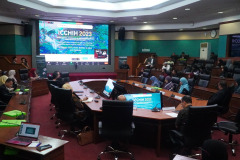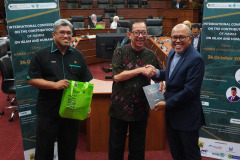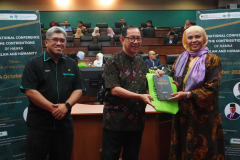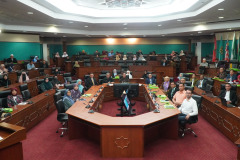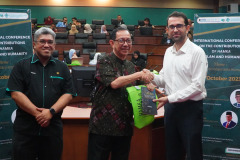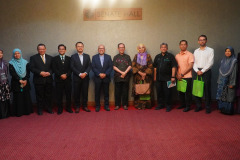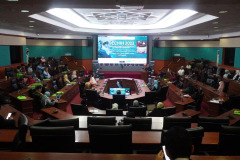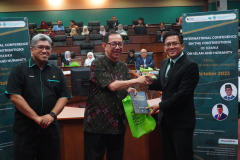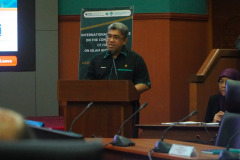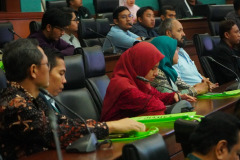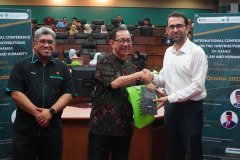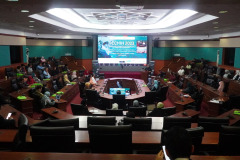INTRODUCTION/BACKGROUND
The Department of Usul al-Din and Comparative Religion was established in 1997 along with other Islamic Revealed Knowledge departments in the AbdulHamid AbuSulayman Kulliyyah of Islamic Revealed Knowledge and Human Sciences (IRKHS). It promotes the Islamic sciences relevant to contemporary disciplines of study. It develops an Islamically – based integrated and holistic approach to education and career. Its niche area is “comparative approach in the study of Islamic Heritage, Thought, and Other Religions on the basis of Usul al-Din. It offers a four-year full-time program of studies leading to the Bachelor of Islamic Revealed Knowledge and Heritage with Honours in Usul al-Din and Comparative Religion, and postgraduate degrees at the Master and PhD levels in Islamic Thought and comparative Religion. The Department adheres to the philosophy, vision, mission and objectives of the University, and it aims to provide students with knowledge and Islamic values. A unique feature to be found in all the programs of the Department is the “Relevantization of Islamic Heritage” to contemporary realities.
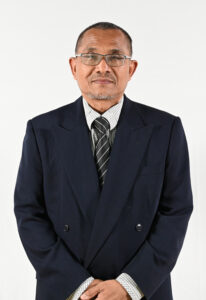
- Head of Department
- Tel: +603 6421 5550
- Fax: +603 6421 5516
- Senior Administrative Assistant
- Tel: +603 6421 5551
ACADEMIC STAFF
- Prof.Dr.Muhammad Mumtaz Ali
- Prof.Dr.Thameem Ushama
- Assoc.Prof.Dr.Fatmir Shehu
- Assoc.Prof.Dr.Haslina Ibrahim
- Assoc.Prof.Dr.Ismail Mamat
- Assoc.Prof.Dr.Abdul Salam@Zulkifli Muhamad Syukri
- Assoc.Prof.Dr.Adibah Abdul Rahim
- Assoc.Prof.Dr.Amilah Awang Abd. Rahman@Jusoh
- Assoc.Prof.Dr.Mohd. Noh Abdul Jalil
- Dr.Asma Binti Muhammad Uthman El-Muhammady
- Dr.Ahmad Arif Zulkefli
- Dr.Fadzilah Din
- Dr.Majdan Alias
- Dr.Masitoh Ahmad
- Dr.Maziah Mustapha
- Dato’ Baharudin Ahmad
- Assoc.Prof.Dr.Megawati Moris
- Assoc.Prof.Dato’Dr.Muhammad Ayman Al-Akiti
- Dr.Noor Amali Mohd. Daud
- Dr.Nur Suriya Mohd Nor
- Dr.Zainul Abidin Abdul Halim
Postgraduate Programmes
Doctor of Philosophy
– Usul Al-Din and Comparative Religion—Under Maintenance
Master of Islamic Revealed Knowledge and heritage
– Usul Al-Din and Comparative Religion
Undergraduate Programmes
Bachelor of Islamic Revealed Knowledge & Heritage (Honours)
– Usul al-Din & Comparative Religion—Under Maintenance
HAMKA RESEARCH UNIT
- The International Islamic University Malaysia (IIUM) was established with the vision of restoring the dynamic and progressive role of the Muslim Ummah in all branches of knowledge and intellectual discourse. Part of its noble mission is Islamization of knowledge, which aims at integrating between religious sciences and human sciences for it aspires that human civilization would prosper while retaining its moral fervour at the centre. Hence, the academic programmes of the University are universally designed that it caters for the local as well as international communities’ demand for higher education.
- The University aims to produce high-quality intellectuals and professionals by integrating knowledge with faith, and by instilling the universal values ascribed in Islam, in the hope that the graduates would be able to serve the human community and the world at large in a holistic spirit. Ideally, it seeks to contribute towards a comprehensive, balanced and sustainable development of Malaysia as well as the world community.
- The University’s vision is inspired by the worldview of tawhid and the Islamic philosophy of the unity of knowledge, as well as its concept of holistic education. Towards actualising the university’s vision, IIUM’s mission states that the university endeavours to:
- undertake the special and greatly needed task of reforming the contemporary Muslim mind and integrating Islamic Revealed Knowledge and Human Sciences positively;
- produce high-quality intellectuals, professionals and scholars by integrating the qualities of faith (iman), knowledge (`ilm) and good character (akhlaq) so that the graduates can serve as agents of comprehensive and balanced progress as well as sustainable development in Malaysia and the Muslim world;
- foster Islamic values and morality in the academic and administrative staff of IIUM, and enable them to sustain these values in concordance with human knowledge, with the view of making them more useful and relevant to the Muslim Ummah;
- nurture the quality of holistic excellence which is imbued with Islamic moral-spiritual values, in the process of learning, teaching, research, consultancy, publication, administration and student life;
- exemplify an international community of dedicated intellectuals, scholars, professionals, officers and workers who are motivated by the Islamic worldview and code of ethics as an integral part of their work culture;
- enhance intercultural understanding and foster civilizational dialogues in Malaysia as well as across communities and nations;
- develop an environment that instils commitment for lifelong learning and a deep sense of social responsibility among staff and students.
- The above mission statements provide the basis for the fundamentals needed in establishing the Chair of HAMKA at the AbdulHamid AbuSulayman Kulliyyah of Islamic Revealed Knowledge and Human Sciences (AHAS KIRKHS). IIUM’s holistic and wholesome educational philosophy provides a strong drive to rejuvenate the world by synchronising knowledge and faith, reason and revelation, and by proactively contributing to the advancement of knowledge.
- The focus on revitalizing human civilisation undertaken by the University provides the right ambience for the Chair of HAMKA to embark on initiatives that fulfil the intellectual needs of the society and assess their psychosocial milieus. The Chair would also leverage the opportunities to educate the society in the spirit of rahmatan lil ‘alamin.
- Haji Abdul Malik Karim Amrullah or prominently known as HAMKA (1908-1981) is an Indonesian scholar, thinker, religious activist, and novelist who is well known in Nusantara. HAMKA is an eminent scholarly figure who had made a remarkable contribution to the development of Muslims through his knowledge dissemination and relevantisation activities. He had made significant impacts on the ways knowledge should be sourced and approached, systematizing the knowledge, and indigenizing them to the local context.
- One of the greatest contributions of HAMKA is his Tafsir al-Azhar, an exegetical work of the Qur’an. It is a masterpiece that was first ever written by a Malay scholar in the twentieth century. The tafsir which is written in the Indonesian language offers interpretations on the meaning of the Qur’anic verses by addressing the Nusantara context which brought the tafsir closer to the heart and mind of its readers.
- Today, even after forty years of HAMKA’s departure, his works, thought and discourse, continue to inspire Muslim scholars in Nusantara particularly the Malay speaking intellectuals, thinkers and even the public. HAMKA’s thought is relevant and pertinent because he lived in the period of colonization that exposed Muslims in Nusantara to western values, philosophies, plurality, and modern lifestyle. The challenges faced by Muslims at present are the extensions of challenges that were faced by HAMKA and his contemporaries.
The setting up of the Chair of HAMKA is a timely initiative:
- to nurture the development of young intellectuals based on the model of intellectual development adopted by HAMKA. The Chair will be able to provide relevant avenues for intellectual activities and engagement from the Nusantara scholars at present time.
- to position the AHAS KIRKHS strategically to continue playing her intellectual function, especially in spearheading the Nusantara intellectual discourse under the Tawhidic paradigm compatible with the original aspiration of HAMKA. In this regard, the Chair would be an inevitable point of reference for those who are interested in the study of Malay and Nusantara intellectual pursuits, particularly in the manner knowledge is sourced, disseminated and applied.
- Specifically, the establishment of the Chair of HAMKA is to:
- provide avenues for academic activities that encompass studies on HAMKA’s approaches in relevantising knowledge to the local context, and efforts to nurture the mind of young contemporary intellectuals.
- facilitate engagement of scholars from the Nusantara to conduct relevant academic activities and outreach programmes, befitting the intellectual, social, and educational of the University.
- spearhead the Nusantara intellectual discourse under the Tawhidic paradigm, compatible with the original aspiration of HAMKA.
- serve as a point of reference for those who are interested in the study of Malay and Nusantara intellectual pursuits, being aware of the availability of the rich collection of literature published by, and about, him.
The expected activities and outcomes of the Chair would include:
- Engaging in research activities to increase the body of knowledge on issues related to the unity and peace of multicultural society.
- Increasing the number of researchers, research collaborators and graduate students who would engage in the quest for knowledge in related disciplines.
- Providing scholarships for postgraduate students to conduct research related to the contributions of Islam in Nusantara to Muslims and the world. It is expected the Chair will host several postgraduate research students.
- Publishing a significant body of refereed books and articles as a tangible contribution to the study in related areas.
- Establishing a specialized academic refereed journal to facilitate the dissemination of research on issues related to Islam in the Malay World studies and other related topics and areas.
- Promoting intellectual discourse and research related to HAMKA and issues related to the Nusantara and the Muslim world.
The expected activities and outcomes of the Chair would include:
- Courses
The Chair plays the role of a Centre of excellence on Islam and Inter-religious studies as its unique feature. In this regard, it is proposed that at the initial stage, the Chair offers master and doctoral programmes by research. In the case where students need to register for courses offered at the relevant Kulliyyah, the Chair through the cross-listing procedure can offer these courses. It means that lectures and seminars are still conducted at the respective Kulliyyahs. In the long run, the Chair is expected to offer specialised programmes by coursework and the courses offered are the Chair’s courses and the Chair is also to award degrees. - Postgraduate Supervisions
Students shall register as candidates for the Master or Doctoral degree programme by researching the area of Islam and Inter-religious studies under the Chair. The Chair will be coordinating with the relevant Kulliyyah in determining the suitable supervisors or members of the supervisory committee. The candidate’s research, therefore, has to be related with, or fall within, the interest of the Chair. - Teaching and Training through Short Courses
The Chair may conduct short-term courses specifically designed for the needs of experts in institutions, organisations, associations, government departments to improve their knowledge in the related field as well as skills to deal with knowledge. The courses may later be developed into higher-level courses to be offered at certificate, diploma, undergraduate and postgraduate levels. - Research and Consultancy
At the core of the Chair’s activities, it is expected that it should conduct cutting edge research, both theoretical as well as empirical, and of high-quality work. The Chair is also expected to produce accredited peer-reviewed publications and to publish papers in scholarly journals. This will build its reputation for innovative research with high social impact.
The Chair’s researchers are expected to write books, chapters in books, articles in local and international accredited journals, and research reports. The Chair can also take advantage of the doctoral interns and fellows to enhance the research activities.
To strengthen the financial standing of the Chair, the researchers are encouraged to attract grants and consultancies from international funders, organisations and state departments, who are interested in seeing research having a high impact in the arena of policy and practice. - Specialised Programme
Post-graduate Diploma (that focuses on the area of Islamic Studies, Inter-religious studies, education and other related areas).
– Masters Degree
– PhD - Policy Making
The Chair has also the mission to become a major contributor to policy formulation for the new constitutional order and community and public system, focusing on the structure of the state and its administration system and agencies, the electoral system, gender issues, children’s rights, policy-making and the transformation of the inter-religious and racial relation. It is anticipated that the Chair’s work will also focus on the effective implementation and functioning of laws and policies that oversee institutions that are critical to human rights and democracy.
The Chair’s activities should also assist in the transformation of Islamic studies, education, and inter-religious relation in Nusantara. The Chair is expected to be among the reference centre for policies makers, ministries, government agencies and other Federal and State institutions. - Working with Government
Based on its expert staff, members will be consulted by and appointed to, important state institutions and forums. It is also anticipated that they will be commissioned to write numerous laws, policies and guidelines. - Outreach
From the outset the Chair should also make an effort to demystify the law and policies, making it accessible to a broader public than lawyers. A primary vehicle for this purpose should be the journals and bulletins. - Roundtable Consultation
Roundtable Consultation is an effort on the part of the Chair to initialize the possibility of becoming the intermediary in issues on public interest. The roundtable discussion will be called when there are pressing needs to consult all relevant stakeholders with the hope that a desirable conclusion and recommendation can be arrived at. Professors and other faculty members can participate and become the moderator. This will provide an opportunity for them to be involved in the policymaking process. - Publication
It is expected that the research undertaken by the Chair will be published in reputable journals and relevant publications. Books and monographs can also be published and converted to digital forms for the public to benefit from. Publications may also contribute revenue to the Chair.
International Conference on the Contributions of HAMKA to Islam and Humanity (ICCHIH) 2023
- ICCHIH »
- Opening and Closing Ceremony
Location:
HAMKA Research Unit, Level 4, IRK Building, International Islamic University Malaysia (IIUM),
Jalan Gombak, 53100, Kuala Lumpur, Malaysia
Contact:
Assoc. Prof. Dr. Mohd. Noh Bin Abdul Jalil
Coordinator
(+603) 6421 6137/5551/1208
HAMKA email address: hamkacentre@iium.edu.my

